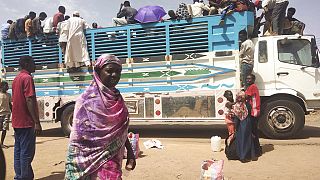The Morning Call
by Fridah Mlemwa
There are at least over 1 billion persons with disabilities worldwide. While this signifies a huge potential market for travel and tourism, it still remains vastly under-served due to inaccessible travel and tourism facilities.
Services, as well as discriminatory policies and practices are also another setback, according to the United Nations. Tourism destinations need to make effort to ensure any tourist, regardless of their age, physical, sensory or cognitive abilities can access their products and services.
However for a visually impaired couple, Joanne and Harold Wilson these limitations will not hold them back. They have set to visit all the parts, corners and crooks of the world, unperturbed by their lack of sight. So far they have been to almost half the countries in the world.
‘‘Harold and I are both blind but we love,love, love, traveling. We made an agreement that we would try and go to all seven continents, and we have done that. We have been to all seven continents including Antarctica. And have been to 73 different countries. And you might ask, why do a couple of blind people want to go traveling ? They can’t see,’‘ said Joanne of their passion to travel, adding ‘‘Well sighted people won’t need to travel if travel was only dependent on what they could see. They could stay at home and just look at videos or look at pictures in a book. But Traveling is much more than just seeing what is around you. It is experiencing what is around you. We love to go and meet people and talk with people and learn about their culture and learn about how they are living their lives. We love to go shopping and buy the arts and crafts that are in the country. And we love,love,love to eat the food.’‘
Africa associated with poor infrastructure and developing tourism sector, is one of the continents they have visited as well. Their experience has been one of the best, because the African hospitality ranks high in the world.
Joanne explained their experience there, ‘‘We heard about gorilla tracking ; We thought ooh our love for animals so lets go gorilla tracking. So we contacted Miriam from the Uganda tour operators, she had to be quite an advocate for us and she really believed in us as blind people. And really believed we could the gorilla tracking or at least be given the opportunity to try. And she said she had to convince the park people to let us go and helps us re-educate the folks at the park in Uganda that blind people really could do it. We don’t always find the Miriams all over the world. We find some folks who doubt what we can do. We say, just give us a try ; We got here to your country, just see what we can do and fortunately we have always succeeded in everywhere we have gone.’‘
Dear traveller, make the effort to help the disabled where need be in your travels.





![Africanews celebrates fifth anniversary [Night Shift]](https://static.euronews.com/articles/stories/05/57/72/74/320x180_cmsv2_6b1e7837-a917-526b-b3b4-4582a3f8bcac-5577274.jpg)
![Africanews celebrates fifth anniversary [Morning Call]](https://static.euronews.com/articles/stories/05/57/72/70/320x180_cmsv2_a6c857d4-80a3-510a-88e6-f060ea8d9ee9-5577270.jpg)






01:29
Haiti sees first domestic flight in seven months take off from Port-au-Prince
01:27
After voting Republican, some Arab-Americans are disappointed with Trump
Go to video
USA: What to remember from Trump's "travel ban"
01:30
African Union expresses concern over US president's new travel ban
01:49
Tourists, wildlife attempt amicable co-existance at Cape Town harbour
Go to video
Kenya eases travel rules for most African nations